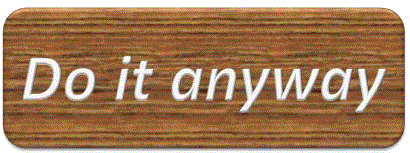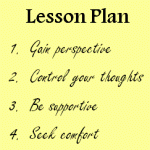Archive for October, 2014
If You Want to Quit Your Job in 2015, Check These Items Off Your List by December 31st
If you’re planning to quit your job in 2015, there are multiple things you can do before the end of the year to be better prepared.
Use your healthcare benefits. This is especially important if you’ve met your deductible for 2014, or are getting close. If you move to a new employer, your healthcare benefits may have higher deductibles or lower co-pays, or exclude the practitioners that you currently see.
Don’t forget the optometrist! Even if you have never worn glasses or contacts before, if your benefits include an eye exam, it is worth looking into (ha!). Or, if you have been wearing the same lenses for a long time, your vision might have changed. Many eye care benefits allow for one set of prescription glasses or contacts each calendar year. If you get new glasses now, you could also get prescription sunglasses or contacts in January.
My vision constantly gets better or worse. When I switched to private insurance, I no longer had optometrist benefits. Fortunately when I had benefits in the past, I got new glasses each year as my prescription improved or worsened, so now I can rotate through them as my sight changes.
Get your charitable donations matched. If your company has a charitable gift-matching program, take advantage of it by making your donations now.
If you can afford it, max out your employer-sponsored retirement saving plan. Got a 401(k), 403(b), 503(b), or another annualized retirement saving plan that your company matches? Most plans start over on January 1st. If you aren’t able to contribute the maximum limit, can you contribute enough to receive your employer’s highest matching amount? This is part of your earned compensation. Don’t leave it behind when you go.
If you’re trying to save money, consider taking less vacation time this holiday season so that you can cash it out when you quit. If you work for a company that is slow during the holidays, this can be a great time to be on the job anyway. It will be quieter and calmer, and you can work on the projects that are most important for you to accomplish before you leave. You can also use the extra privacy to print paystubs, retirement plan or stock details, and your past performance reviews.
Enjoy your holiday bonuses. If your employer gives cash bonuses or gifts in December, take an extra moment to savor them. To everyone else they are end-of-year extras. For you, they are your parting gifts.
Do it Anyway
 One of the students in my Emotional Intelligence class told our group about her childhood. She had tough experiences growing up, and continues to deal with challenging family issues. She talked about feeling overwhelmed at times.
One of the students in my Emotional Intelligence class told our group about her childhood. She had tough experiences growing up, and continues to deal with challenging family issues. She talked about feeling overwhelmed at times.
Her situation was unique, but I can relate to it. Don’t we all have something challenging in our pasts that we had to work to overcome? Don’t we all face situations from time to time that drag us down?
It’s what she told us next that stuck with me. She talked about volunteering with groups that help disadvantaged women and said she does it even when she feels sad. She contributes and gives support to others, even when she is grieving her own losses.
She felt sad and did it anyway.
A few days ago I read an article by Scott Dinsmore about fear. He talked about being paralyzed by doubt when he sat down to develop a new course. He talked about nearly cancelling a workshop that he had already advertised because when he tried to create the materials, he choked.
Then he wrote something really interesting. He said that when he completed those programs, he was proud of the way they turned out, and that he considers them the most significant work he’s ever done. Wow.
He was afraid and did it anyway.
This week I gave a short presentation to a local Rotary group, on the topic of preparing to quit a job. It was a great experience – the Rotarians were gracious and I enjoyed the chance to connect with them. Plus, it was fun to speak about what I’d learned from all those hours of research. But leading up to the event… I was tired!
I had some of the Scott Dinsmore-styled fear, and am still grieving the loss of my beloved cat. But what really threw me off balance were two weeks of personal mayhem. Unexpected events consumed much of the hours and energy that I planned to use on preparing for the talk. Instead, I was on edge and sleep deprived, but I chose to work through the fatigue to narrow my topic, review my slides with friends and rehearse.
I was tired and did it anyway.
It doesn’t mean that we should keep pushing ourselves nonstop. Now that my presentation is done, I’m resting more, drinking immune-system-building tea and scaling back on social events while I regain my energy.
I’m a big believer in giving ourselves breaks. I think we should overcome the pressure to operate like robots, and stop congratulating ourselves when we ignore the need to rest and recover. But there’s a difference between relentlessly pushing ourselves past healthy limits and taking on specific challenges that require extra effort. Sometimes a goal or activity is worth the exertion required to get past obstacles like sadness, fear and tiredness.
The next time I have a big opportunity in front of me, one that is worth going after, I’m going to acknowledge how I feel about it. I’m going to think of ways to maintain my health while I pursue my goal. And then I’m going to —
do it anyway.
Why it’s Smart to be Prepared to Leave Your Job on a Moment’s Notice
Whether you plan to quit your job now or never, it is smart to be ready to leave on a moment’s notice. It’s not about being fearful that you might lose your job. It’s about gaining confidence by being prepared.
Here’s why it’s important:
- Being ready to quit is like having a grab-and-go bag for your career. Tomorrow might be your last day at work whether you want it to be or not. Layoffs happen, businesses fail, companies relocate. Job security is more of a wish than a reality.
- You’ll be empowered. You’ll have options and will be less dependent on your employer to meet your financial needs and your personal career goals.
- You may be more successful at your job. Feeling that you can leave at any time, you might take smart risks that pay off. You might speak up more, and get more attention for your projects.
- You’ll be more agile. If you’re shoulder-tapped to transfer to a new role or new location, you can change gears quickly. Or you can say no and let the chips fall where they may, because you’re ready for it.
There are multiple components to being fully prepared that involve finances, health, shoring up support and more. If you don’t know where to start, take a look at your work tools. If you’re using a computer or cell phone provided by your employer, would you be ok if you were asked to hand them over tomorrow? If not, wipe all your personal photos, documents and data from your employer’s property. Stop using your company’s email address for personal communications. Make sure you have copies of your address book on your own computer and phone.
Another step is to make sure you’ve got copies of important information safely stored at home. This includes copies of your performance reviews and records of awards and achievements, so you can use that information to customize resumes in the future. It also includes having a portfolio of work samples that you can use in future interviews or as resources in your next role. Work samples could be snapshots of projects you worked on, non-confidential reports and presentations, or tangible materials that you produced. Make sure to take home financial documents like recent pay stubs and information about company-sponsored retirement plans and investments.
A third place to consider is your work space. Years ago my office was draped in personal belongings. I had two lamps, framed art on the walls, and a bookcase full of books, awards and photos. I even had hippie beads hanging from my door frame. (Don’t judge – people loved my office!) But when I left my office for the last time, I walked out with a single cardboard box of personal items. As I was working through my exit plan, I slowly swapped out the objects that were most important to me with fewer and more portable pieces. If you make this transition thoughtfully, nobody else will notice. But you’ll have the satisfaction of knowing you could hold your cardboard box in one hand while you use the other to wave ‘bye.
Hard Lessons
These are lessons I didn’t want to learn. If the tradeoff was having Milo with me or knowing what I know now? I’d pick my cat. Of course I would.
But life doesn’t work that way, so I figure that the only thing worse that losing him would be to not learn anything from it.
The first lesson came when my cat started showing symptoms that were later diagnosed as thyroid disease and lymphoma. I fell apart every day. Sometimes multiple times in a day. By falling apart I mean crying, and moments where my energy drained out of me and all I wanted to do was lay down.
Then I decided that I didn’t want to live like that anymore. With chemotherapy and his other medicines, it was possible that he would have lived for up to three more years and I didn’t want to be depressed that entire time. I made a choice not to make his illness the center of my life. I had a book to finish, relationships to care for and work to do. When he died, that choice became not making his death the center of my life.
The second lesson I learned is that I can control my thoughts. We hear a lot about this – the power of positive thinking, we create our own realities, blah blah. At different times in my life I have tried to consciously choose my thoughts but it wasn’t that effective. I also had some scorn about people trying to brainwash themselves into believing they were better off than they actually were. It seemed unauthentic.
Soon after Milo died, I felt a tremendous sense of guilt and regret. Not about euthanasia at the end. I regretted that I hadn’t rushed him to the ER sooner after he started going downhill the last time. He stopped eating and drinking and I waited, thinking about how stressful the hospital was and how much he hated it. I waited, wondering if would be better to let him die at home than put him through more intervention. I waited, asking myself how many times we were going to do this. Then the decision got past me, and by the time I took him to get fluids, it was a hospice mission.
After he was gone, I wished I could go back in time and make a different choice. I kept thinking, “if only I had taken him to the hospital sooner, would he still be alive?” These thoughts were so painful that I had to stop them. I realized that they didn’t serve me – they only caused me to suffer, and they didn’t honor Milo’s life. I made myself acknowledge that there is no way of knowing if he would have lived longer, and that thinking I made the wrong choices was just one story. Another story is that I did the right thing. Possibly more treatment would have been worse for him, or he might have died there, in the place he hated, away from me.
The “if only” thoughts still came, but when they did, I forcibly stopped them. As soon as I caught myself, I would think, “NO!” And then tell myself, “I choose to believe the possibility that I made the right choices.” At first this scenario played out repeatedly. After a while, less so.
The third lesson was that the support I received taught me how to support others in grief. One friend called me the evening that Milo passed away, and just listened. She invited me to go out the next night, and getting out and doing something helped. Another friend came to my house the next day with a plant, and the formalness of it made me feel like we were memorializing Milo. Receiving cards and reading messages from people on Facebook also helped.
In the past, I wasn’t always one to reach out when someone else experienced a loss. I might have been unsure if making contact was welcome. What if they wanted to be alone with their grief? Or I felt unsure of what to say and then didn’t reach out at all. After being comforted by other people’s gestures, I decided that even if I didn’t know what that person wanted, it is better to send an email, a text or make a phone call than not.
The last lesson I’ve learned is to look for support and comfort. Besides accepting help from my friends and family, I took action on my own. I read articles online about grieving animal companions, and found a weekly candle lighting ceremony at www.petloss.com. Each Monday, people across the globe gather online to read a prayer for our animals and light candles to honor them. When the ceremony isn’t taking place, people can use the chat room to seek support from each other.
A few days ago, a blog that I subscribe to included a post called Moving Beyond the Pain of Losing Someone You Love. The author, Karen Lang, wrote about the tragic loss of her son and how for a period of time she doubted the choices she made at the end of his life and was consumed with wondering “what if”. Although our losses are different, she expressed what I had been feeling and that was reassuring.
I also happened to get an email with a link to a podcast that featured Christina Rasmussen, who wrote a book called Second Firsts: Live, Laugh, and Love Again. Normally I have no patience for podcasts, but I listened to this one twice. She uses science to support her theories and talked about the importance of giving ourselves time to rest and recover when we’re hurt: she calls this “the waiting room”.
No matter what I have going on in my life, I feel self-imposed pressure to complete my self-imposed deadlines for work and writing. When I take breaks or try to get extra rest, I often wind up feeling more anxious instead of energized. Rasmussen’s message pointed out that allowing myself downtime is more helpful than slogging through my to-do list.
None of these lessons are worth what I lost. But they’re better than not learning anything at all.




Recent Comments